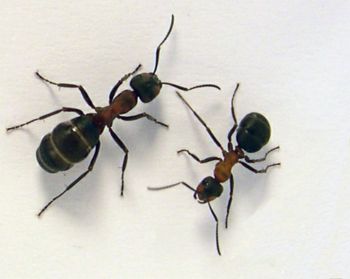An ant’s eye view of the world at science festival
By: James Hakner
Last updated: Friday, 25 June 2010

Show me the way to go home: A fully fed ant and unfed ant
Do you think you can outsmart an ant? That's the challenge being set by Sussex scientists, who will be presenting their research into how insects find their way home at the prestigious Royal Society Summer Science Exhibition, which opens today (25 June).
Researchers Dr Andy Philippides (Informatics) and Dr Paul Graham (Life Sciences) from the Centre for Computational Neuroscience and Robotics (CCNR) will be explaining to visitors at the London exhibition the surprisingly complex mechanisms used by small-brained nest-dwelling insects as they navigate back home from foraging expeditions.
Andy says: "When insects go foraging, they zoom off from their nest in complex zig-zag paths. How do they manage to find their way back home? And how do they manage to do so along a straight path?"
To explore these questions, the team will be inviting visitors to try the "Ant Challenge" to discover if a human, with a brain 100,000 times bigger than an ant's, can find a target location using ant-like navigational strategies and vision (reproduced by viewing the world through specially designed mirrors).
Andy says: "Ants are amazing navigators. We and many other people study them as their remarkable behaviour gives scientists insights into the cognitive building blocks of intelligence, and inspires the design of artificial brains for autonomous robots."
The team at Sussex use robotic modelling and behavioural experiments to investigate insect navigation.
One current question is how ants encode a visual scene with low-resolution vision. For instance, it was recently found that ants can recognise a place using only a crude skyline.
Continuing research will also look at how innate behaviours can accelerate the process of learning visual information.
The Summer Science Exhibition runs every day until Sunday 4 July, from 10am-8.30pm in the Royal Festival Hall at London's Southbank Centre. There are 27 interactive exhibits on show, presenting the best of UK science, engineering and technology. Entry is free.

